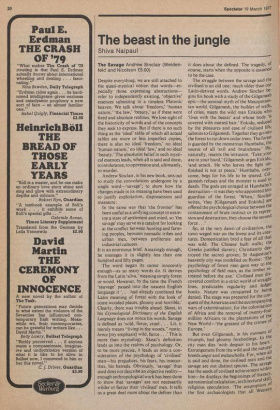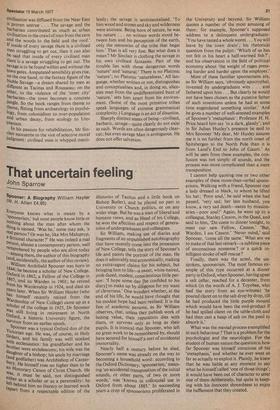The beast in the jungle
Shiva Naipaul
The Savage Andrew Sinclair (Weidenfeld and Nicolson £5.00) Despite everything, we are still attached to the quasi-mystical notion that words—especially those expressing abstractions— refer to independently existing, 'objective' essences subsisting in a timeless Platonic heaven. We talk about 'freedom,' human nature,' the law,' beauty,' as if these were fixed and absolute realities. We lose sight of the historicity of words and of the concepts they seek to express. But if there is no such thing as the 'ideal' table of which all actual tables are more or less imperfect copies, there is also no ideal `freedom,' no ideal 'human nature,' no ideal 'law,' and no ideal 'beauty.' The absolutist belief in such mystical essences leads, when all is said and done, to intolerance, to oppression and, ultimately, to murder.
Andrew Sinclair, in his new book, sets out to study the convolutions undergone by a single word—'savage'; to show how the changes made in its meaning have been used to justify exploitation, dispossession and massacre: In the same way that 'the frontier' has been useful as a unifying concept to examine a state of settlement and mind, so 'the savage' may serve as a catalyst for looking at the conflict between hunting and farming peoples, between nomadic tribes and urban men, between preliterate and industrial cultures.
It is an enormous brief. Amazingly enough, he manages it in slightly less than one hundred and fifty pages.
The word began its career innocently enough—as so many words do. It derives from the Latin 'silva,' meaning simply forest or wood. However, by the time the French `sauvage' passed into the nascent English language it . . had already combined the Latin meaning of forest with the look of some wooded places, gloomy and horrible.' Clearly, there was trouble ahead. Skeat, in his Etymological Dictionary of the English Language does not mince his words. Savage is defined as 'wild, fierce, cruel . . . Lit, it merely means "living in the woods," rustic; hence [my emphasis] wild, fierce ...' This is more than etymology. Skeat's definition leads us into the realms of psychology. Or, to be more precise, it leads us into a consideration of the psychology of 'civilised' man—his prejudices, his fears, his insecurities, his hatreds. Obviously, 'savage' thus used does not describe an objective reality— enough anthropological work has been done to show that 'savages' are not necessarily wilder or fiercer than 'civilised' men. It tells us a great deal more about the definer than
it does about the defined. The tragedy, of course, starts when the opposite is assumed to be the case.
The struggle between the savage and the civilised is an old one: much older than our Latin-derived words. Andrew Sinclair begins his book with a study of the Gilgamesh epic—the seminal myth of the Mesopotamian world. Gilgamesh, the builder of walls, of cities, meets the wild man Enkidu who 'lives with the beasts' and whose body 'is covered with matted hair.' Enkidu, seduced by the pleasures and case of civilised life, , submits to Gilgamesh. Together they go into the forest to cut down cedar trees. The forest is guarded by the monstrous Humbaba, the source of all 'evil and brutishness.' He, naturally, resents the intrusion. 'Take your axe in your hand,' Gilgamesh urges Enkidu, 'and attack. He who leaves the fight unfinished is not at peace.' Humbaba, overcome, begs for his life to be spared. Gil" gamesh refuses and the monster is axed to death. The gods are enraged at Humbaba s destruction—it was they who appointed him guardian of the forest. 'When,' Sinclair writes, 'they [Gilgamesh and Enkidu] are offered the psychological choice between the containment of brute instinct or its repression and destruction, they choose the second force ...'
So, at the very dawn of civilisation, the town waged war on the forest and its creatures. Domestication bred a fear of all that was wild. The Chinese built walls; the Greeks justified slavery ; Christianity destroyed the sacred groves; St .Augustine's heavenly city was modelled on Rome: 'The psychology of forest man gave way to the psychology of field man, as the timber retreated before the axe.' Civilised man discovered comfort in a strict world of straight lines, predictable regularity and ledger books. Nature was conquered by being denied. The stage was prepared for the conquest of the Americas and the accompanying wars of extermination; for the colonisation of Africa and the removal of twenty-four million Africans to the plantations of the,. New World—'the greatest of the crimes ot Europe.' But even Gilgamesh, in his inoment of triumph, had gloomy forebodings. In the city man dies 'with despair in his heart.i Estrangement from the wild and the natural breeds angst and melancholia. For, when a I is said and done, the civilised man and the savage are not distinct species. The savage has the seeds of civilised achievement within him--he displays the beginnings of literacy, astronomical calculation, architectural skill, religious speculation. 'The assumption
the first archaeologists that all Western
civilisation was diffused from the Near East is proven untrue . . . The savage and the barbarian contributed as much as urban Civilisation in the crawl of men from the cave and the woods to the field and the roof.' If inside of every savage there is a civilised man struggling to get out, then it can also be said that inside of every civilised man there is a savage struggling to get out. The savage is to be found within and without the town gates. Amputated sensibility gives rise, on the one hand, to the fantasy figure of the Noble Savage—a dream shared by men as different as Tacitus and Rousseau; on the Other, to the violence of the 'inner city' b. arbarian—the town becomes a concrete Jungle. So the book ranges from theme to theme, flitting from archaeology to psychology, from colonialism to over-population arid urban decay, from ecology to UtoPianism.
In his passion for rehabilitation, Mr Sinlair succumbs to the vice of selective moral Judgment: civilised man is whipped merci lessly; the savage is sentimentalised. `To him wood and stones and sky and wilderness were animate. Being born of nature, he was his nature . . . no written words stood between him and his perception of the earth, only the memories of the tribe that begat him.' That is all very fine. But what does it mean ? Mr Sinclair is clothing the savage in his own civilised fantasies. Part of the trouble lies with those dangerous words 'nature' and 'natural.' There is no Platonic 'nature'; no Platonic 'naturalness.' All language, whether written or not, distinguishes and conceptualises and, in doing so, alienates man from the undifferentiated buzz of 'nature,' sets him apart from his environment. (Some of the most primitive tribes speak languages of extreme grammatical complexity.) Language is an act of disunion.
Sharply distinct states of being—civilised, barbaric, savage—quite clearly do not exist as such. Words are often dangerously clearcut; but even savage Man is ambiguous. He does not offer salvation.



































 Previous page
Previous page